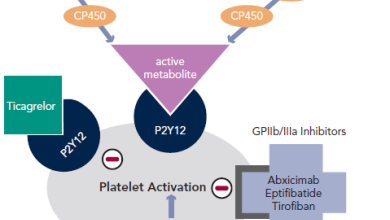Search results
PROMOTED
Author(s):
Nicolas M Van Mieghem
,
Kendra J Grubb
,
David Hildick-Smith
,
et al
Start date:
Mar 26, 2024
Author(s):
L Nelson Hopkins
Added:
3 years ago
At least 795,000 people suffer a new or recurrent stroke each year in the US.1 Every 40 seconds, someone in the US has a stroke, and stroke is the third leading cause of death in the US.1 These numbers are likely to increase as the US population ages and as stroke awareness increases. In the past, ischaemic stroke has been managed with palliation and rehabilitation and with prevention of the…
View more
Author(s):
Benjamin Galper
,
Roxana Mehran
Added:
3 years ago
Acute coronary syndromes (ACS) result from unstable coronary artery plaques that rupture and can lead to coronary ischaemia, unstable angina and myocardial infarction. The treatment goals in ACS focus on reducing ischaemia, preventing further progression of thrombotic plaque by disturbing the milieu of thrombosis and platelet aggregation taking place within the coronary artery and, in the case of…
View more
Author(s):
Helen Routledge
,
Andrew SP Sharp
,
Jan Kovac
,
et al
Added:
1 year ago
Author(s):
Florian Hecker
,
Mani Arsalan
,
Thomas Walther
Added:
3 years ago
Transcatheter aortic valve replacement (TAVR) has become the default treatment option for high-risk patients with aortic stenosis (AS) and, based on heart team discussion, an alternative to surgical aortic valve replacement (SAVR) in intermediate-risk patients.
TAVR has led to a paradigm shift in the basic therapeutic principle to treat AS: calcifications, in some patients quite excessive, are…
View more
Author(s):
Kay Woon Ho
,
Vladimír Džavík
Added:
3 years ago
Techniques and devices used in percutaneous coronary intervention (PCI) have evolved significantly since the inception of the procedure. Procedural and patient outcomes have improved, while more complex coronary lesions in high-risk patients are being attempted with increasing frequency. High-risk procedures are carried out in patients with marked left ventricular dysfunction, acute coronary…
View more
Author(s):
Sami A Omar
,
Adam de Belder
Added:
3 years ago
There will be guidelines about the optimal management of most clinical situations. It makes decision making in medicine more universal, but often you have to think about all of the awkward situations that sit outside the guidelines. One neglected area of research involves the management of illness in older people. The older patient is often not included in trial protocols, and so a well of…
View more
Author(s):
Antonio Greco
,
Claudio Laudani
,
Carla Rochira
,
et al
Added:
1 year ago
Author(s):
Sri Raveen Kandan
,
Thomas W Johnson
Added:
3 years ago
Antiplatelet Therapy
Current guidelines support the early administration of oral antiplatelet agents upstream of angiographic assessment and intervention.1 Aspirin is commonly given by the first medical contact and additional oral antiplatelet drugs are administered on arrival in hospital (see Figure 1).
Aspirin
The efficacy of aspirin in acute ST-segment elevation myocardial infarction (STEMI)…
View more
Author(s):
Ulrich Schäfer
Added:
3 years ago
As the field of interventional cardiology has grown, so too has interest in mitigating severe adverse outcomes such as stroke. Unfortunately, the risk of stroke is increased by many underlying disease conditions (atrial fibrillation, patent foramen ovale, carotid artery disease and other vascular disease affecting brain perfusion, etc.), making clear differentiation between cardiac intervention…
View more















